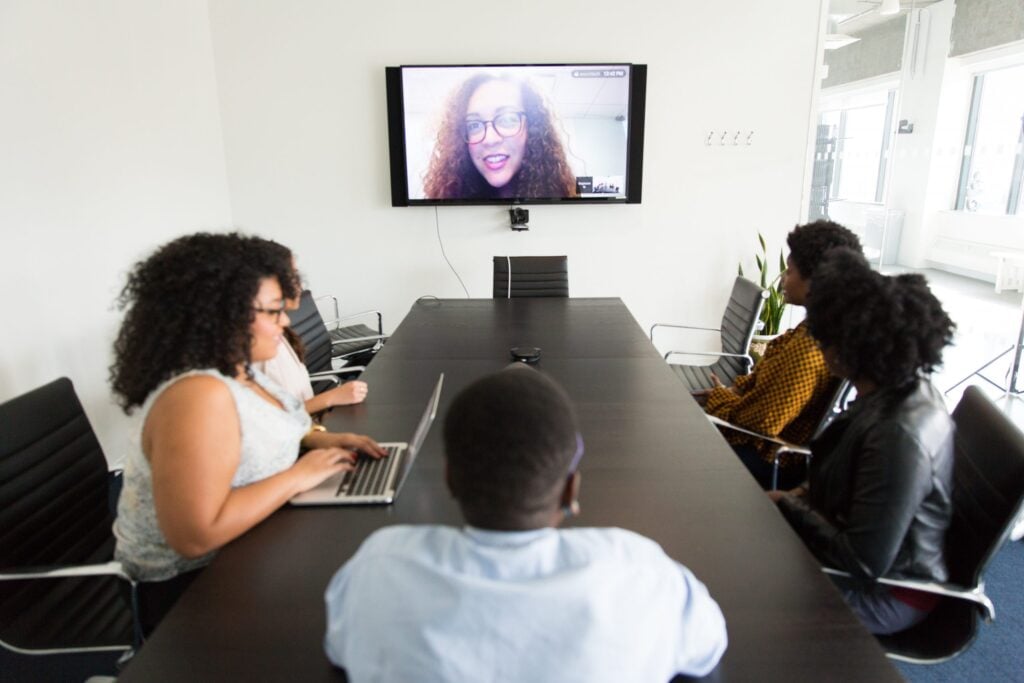In the post-pandemic world, remote work and hybrid work models are on the rise. Many companies are looking for ways to keep employees in the office connected with those working from home. But is there way to improve the “doing a video call in front of a tiny laptop screen” conference call? In this post, we’ll talk about the best hardware options for video conference software such as Teams or ZOOM.
Hardware Options and Brands
There are many hardware options and peripherals that you can purchase, but we want to focus on the necessities for a conference room. As you’re looking at your options, keep in mind that you can choose to purchase hardware individually or in bundles.
Monitors/projectors – Monitors and projectors allow everyone on the call to see each other. Monitors are connected to laptops or devices either wirelessly or via a hard connection. You can get a crisper, brighter image with monitors because they emit their own light. However, monitors are generally more expensive and there is a size limit. Brands recommended by Pro AV include:
- NEC
- Planar
- Samsung
- Sony
With projectors, you can display an image that covers an entire wall or whatever large surface you have available! They are also cheaper than monitors. The drawback to using a projector is brightness. You’ll need a dark room (closed windows, no lights) to get good image quality. Some Pro AV recommended projector brands include:
- Epson
- Panasonic
- Sony
Cameras – You don’t want to purchase just any old camera; you want something that will produce clear images and focus on the faces of the participants. Cameras with AI, also known as smart cameras, provide excellent user experience and image quality, using software to deliver socially inclusive meetings. Some Pro AV recommended brands include:
- AVER
- Huddly
- Poly
- Yealink
Whiteboard cameras – If you use a whiteboard during a presentation or meeting, you want people to see what you’re drawing or writing as though they were there in person. Whiteboard cameras capture the information on the whiteboard and sends it to the displays, so everyone has a front row seat view. Those watching from home, will feel like they’re there in the conference room with the rest of the team! Some brands that Pro AV recommends include:
- Huddly Canvas
- Logitech Scribe
Microphone arrays – Microphone arrays are a group of microphones all working together to produce better sound. For example, microphone arrays can pick up the voices of people speaking while decreasing ambient noise. They can also be used to create surround sound so everyone in the room can hear what is being said. Two of the top audio performance brands are:
- Biamp Parle
- Shure MXA
Smart soundbars – If you have a small room, soundbars work very well. These hardware pieces are small, compact, and barely noticeable; however, they do pack a big punch when it comes to sound quality by adding more depth to what you’re hearing. Some good soundbar brands include:
- Crestron
- Logitech
- Poly
- Yealink
Room systems – Room systems are another way to outfit your conference room if you don’t want to pick out every single piece of equipment separately. For example, Poly offers ZOOM rooms and Microsoft team rooms that set you up with a camera and a control panel. Yealink and Crestron also have bundles of conference room hardware that you can purchase.
BYOD: Bring Your Own Device
One popular and important feature to think about is the ability for people to bring and use their own device. Let’s say for example that you have a Teams room, where everything is designed to only run Teams calls. What happens when you need to join a meeting on another platform? A Bring Your Own Device (BYOD) setup lets you plug your laptop into a USB cable and use another platform with the Teams room peripherals. BYOD allows you to leverage the room technology investment you made.
One thing to keep in mind is that not all systems support BYOD. Therefore, it’s important to think about whether you’ll have a need for this feature. If, for example, your calls are mostly within the company and everyone uses Microsoft Teams, then there might not be a need for BYOD. However, if your calls are with various clients using different video conferencing platforms, BYOD is a good choice.
Software-Hardware Compatibility
When choosing hardware, keep in mind what video conference platform you’ll be using. If you use ZOOM, then your hardware should be ZOOM certified. The same goes for Microsoft Teams. Our job at Pro AV is to ensure that every system is easy to use no matter how complex. Plus, our team is always ready to provide guidance, advice, and recommendations along the way.
Pro AV Installation Services
When you’re ready to purchase hardware for your conference room, our job is to make sure that the solution fully integrates with whatever platform you are already using. The Pro AV team will spend time to educate you on the differences between the platforms and solutions so that we can help you match your needs with the platform that is the most suitable. On your end, you would be responsible for purchasing the licenses to use that platform. Once you’ve decided on a platform, we can then make hardware recommendations around that information.
Pro AV can help you choose the best hardware options for Teams or ZOOM, get in touch with us today!




